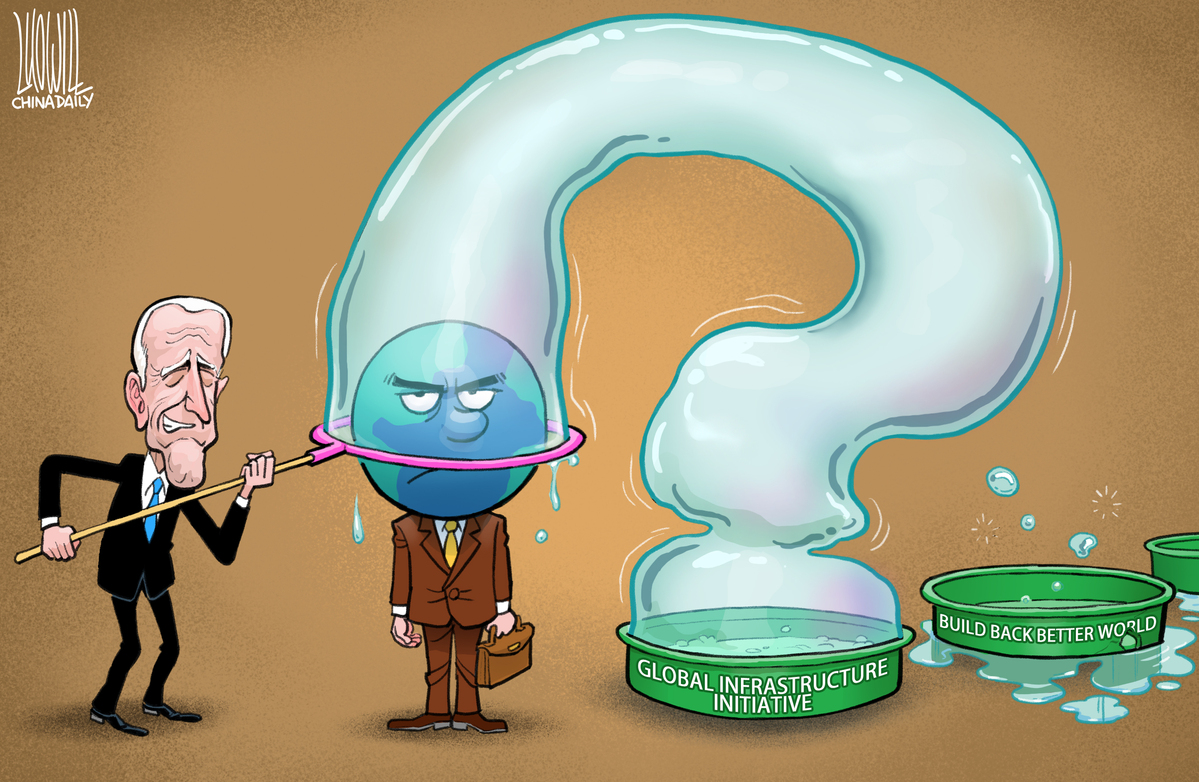
[Photo/China Daily]
This is an editorial from China Daily.
US President Joe Biden will launch a global infrastructure initiative at the G7 summit to be held in Krün, Germany, from Sunday to Tuesday next week, National Security Advisor Jake Sullivan said last week
Sullivan made no bones about the purpose of the initiative, saying it was to counter Beijing's Belt and Road Initiative, particularly in the "Indo-Pacific".
The US-initiated partnership will cover global infrastructure, physical health and digital infrastructure. As Sullivan said, it will provide "an alternative to what the Chinese are offering", with investment from the US and its G7 partners, although he envisions mainly private-sector funding and "relatively modest direct budget allocations" from the US government.
That's another pie the Biden administration is drawing in the sky. He touted a larger infrastructure initiative, the Build Back Better World, at the G7 leader's meet-and-greet in June last year. That produced nothing more than the awkward acronym B3W.
According to Sullivan, the global infrastructure initiative Biden is presenting this time is a more concise — meaning cheaper — version of the B3W. But the humbling of the grandiose plan does not make it any more feasible than its predecessor.
Because of the huge early input, the long time it takes to see returns and the associated uncertainties, US private investors have shown no interest in investing in infrastructure projects at home, never mind in developing countries.
That's why it remains a challenge for the US to upgrade its already backward infrastructure, except for its investor-attractive air transport system. The Biden administration finally resorted to printing more banknotes to press ahead with its dollar-guzzling domestic infrastructure investment plan.
In a similar vein to B3W, the European Commission launched a Global Gateway initiative last year to raise 300 billion euros ($317.26 billion) by 2027 to boost global links. But it also turned out to be an empty-gesture cry for a lot of sheep that garnered little wool.
The Asian Development Bank estimates that Asia alone needs infrastructure investment of at least $26 trillion up to 2030, which does not include investment in soft infrastructure.
Obviously, neither European countries, whose sovereign debt already accounts for more than 90 percent of their gross domestic product, nor the US, which is contracting its easy-money policy to fight inflation, will enthusiastically and liberally stuff money into the empty pie shell that Biden is offering.
Unlike the US initiatives, the Belt and Road Initiative is not exclusive. China is willing to cooperate with the US to reduce the infrastructure shortfall.
Unfortunately, the Biden administration chooses to ignore the benefits that could be accrued from such cooperation that would revitalize the global economy and help promote more robust, greener and more balanced global development.
As China repeatedly stresses, development holds the key to people's well-being and infrastructure is one of the keys to development. But unlocking its potential calls for real actions, not empty words. That is what the Belt and Road Initiative provides, and that is why it has proved so popular.

 中文
中文





